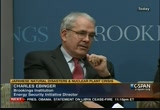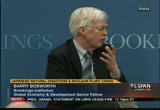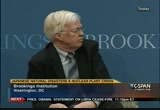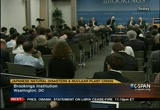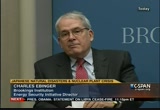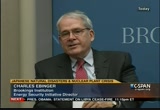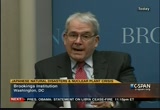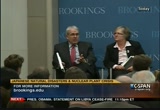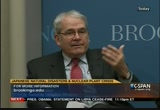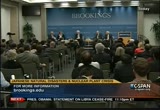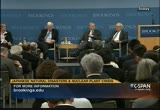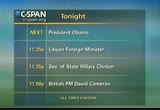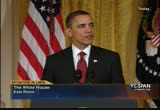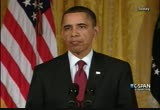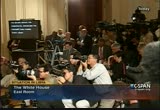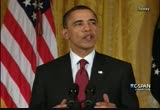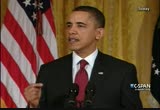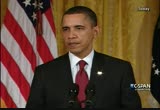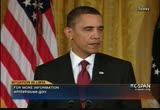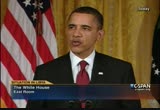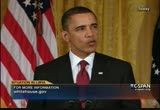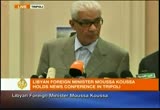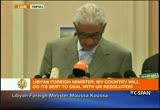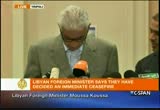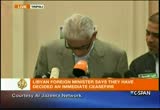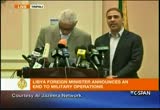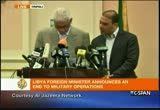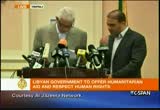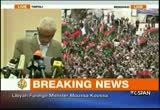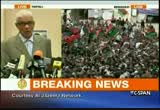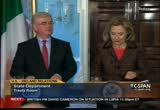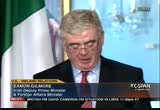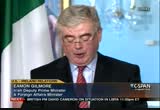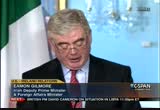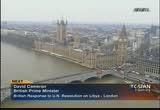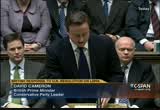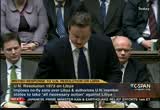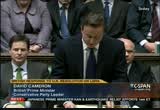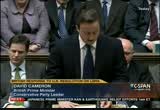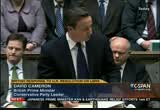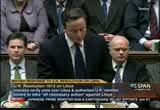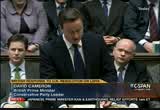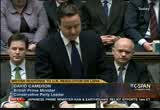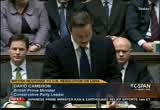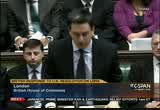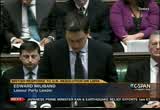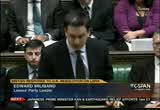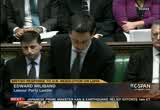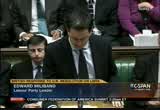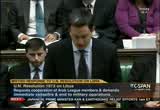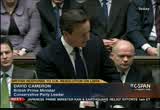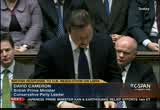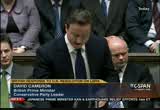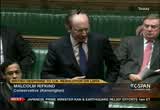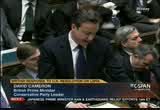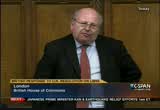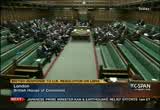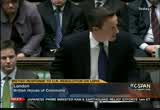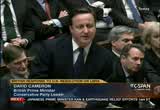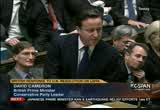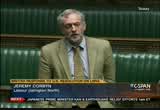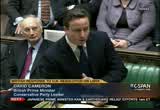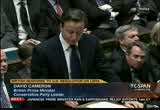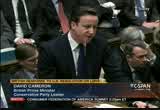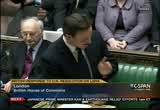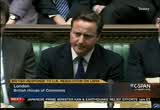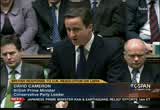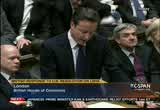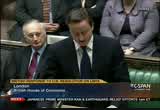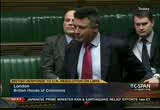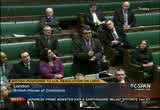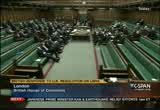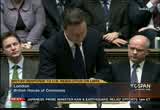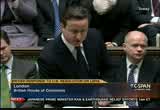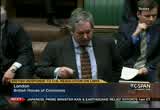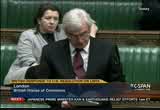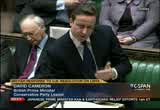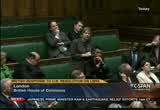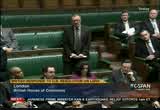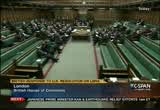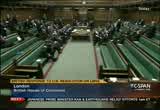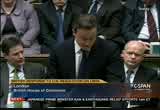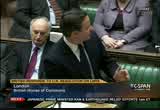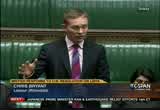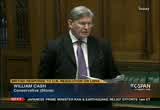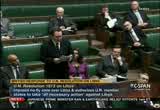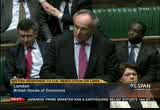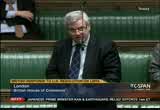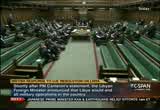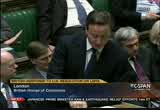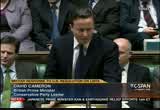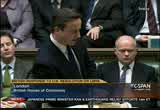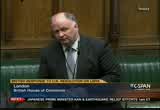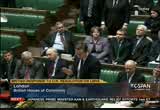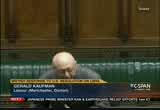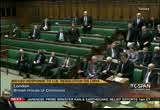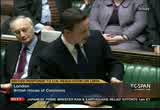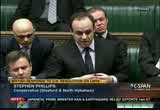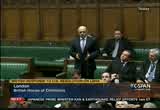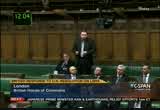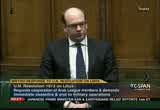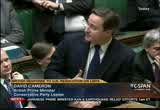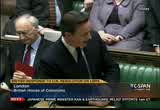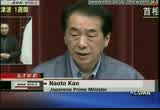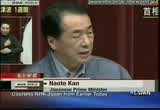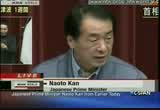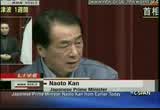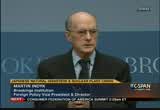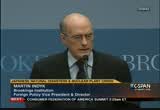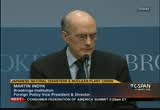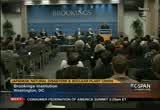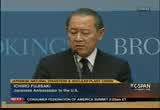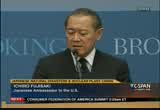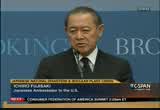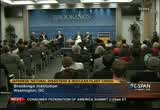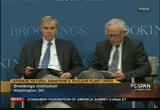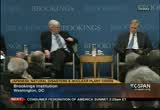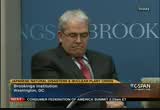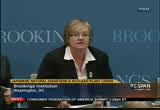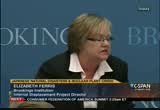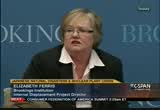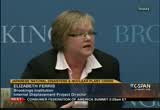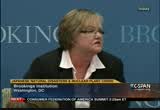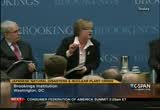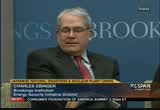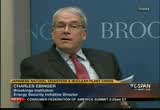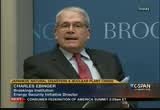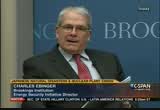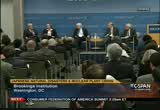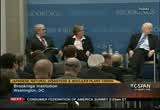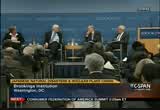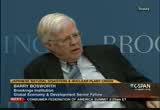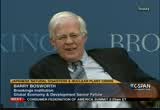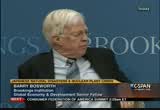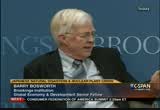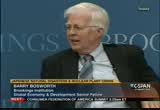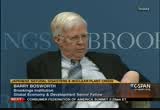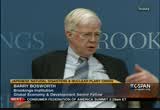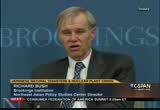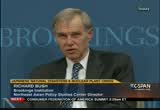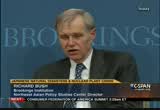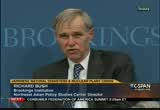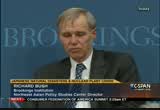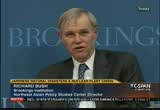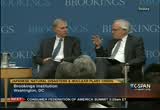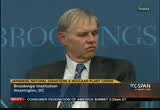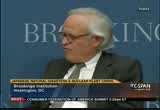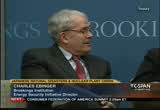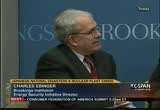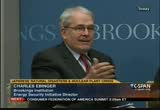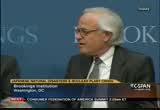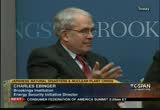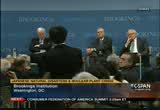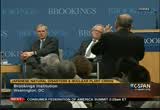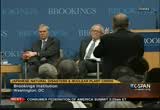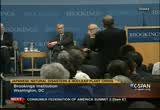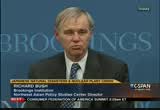tv Capital News Today CSPAN March 18, 2011 11:00pm-2:00am EDT
11:00 pm
france and belgium, you will see continued them -- they will continue their nuclear programs. i think the combination of wanting to reduce their dependence on russian gas and get away from their dirty coal. you will see them continue to push slowly. the united states could set -- gets 20% of its power from nuclear power. between retirements of eight facilities, we will be lucky to keep that 20% 10 of 15 years from now. >> and natural gas? >> that is also 20%. we could raise it to 35% of
11:01 pm
electricity, some say. and keep it there for a long time. >> the u.s. economy? >> almost no impact whatsoever. stock markets go up and down. they always overreact. i would not pay any attention to them. one way or the other. >> a common view. >> the only thing that makes sense is that it drops the most, but if you took seriously their estimate of the cost to japan, to claim that the wealth loss was almost $1 trillion. that is clearly not realistic at all. the drop has been too much. one reason is that the market has been then. there is not that much confidence in it. in europe, there has also been a drop in the stock market, but the same story. the u.s. stock market has been
11:02 pm
pretty resilient. nothing -- nothing much has really happened. maybe it is unfortunate, but japan is simply not a big market for the united states. we do not export much to anybody anymore. in particular we do not export a lot to japan. we worry about japan, it is too soon about a big interruption to our electronic and automobiles supplies. i do not expect that to happen. i do not think that what goes on in japan will have a big effect on the u.s. economy. >> yes, sir. >> there's not much talk about the radioactive effect on human beings.
11:03 pm
the radio act cavity in the air and in the mark -- and in the ocean, should we monitor it -- the radioactivity in the air and in the ocean, should we monitor it? and also, over the years, there is a province in the rigid there is a problem in russia, in france, in argentina, and now in japan. should the i e a e have oversight -- the i e eight -- iaea have oversight of these countries or gerard >> in terms of radiation monitoring. we have a sophisticated global system to register changes in radiation. most of that was developed against the potential for atomic weapons, but it can pretty well picked up what is happening. within japan, there is
11:04 pm
definitely concerned about the food chain. has this incident that's worse, the first place it authentic -- as this incident gets worse, the first place it often hits is dairy products. [inaudible] oh, i am sorry. nearby radiation events, the first concern is about dairy products in terms of the food chain. as this radiation goes over the world, the amount that we're talking about, at least from what we think is going to happen right now, is infinitesimal by that time it reaches any other land mass other than japan. but it could have a serious impact on japan, were to get noticeably worse. we are not expecting -- there was an erroneous report that it would hit southern california and move toward calif -- las vegas. that was not issued by the
11:05 pm
organization that it was said to be coming out, a very prestigious organization out of australia. it was not released by them. it has been discredited by but the australians and the international atomic agency. the iaea, i am not sure where you want to extend their authority. we tried to get a proliferation stan. under their protocol. the right of their inspectors to make snap inspections without warning of any nuclear facility in a country. but in terms of saying that they should have authority over all radiation, environment, and in local countries -- >> [inaudible]
11:06 pm
if they get it from the ocean and given back to the ocean -- >> the iaea has no authority over questions like that. they can advise on safety, on greater knowledge of radiation potentials. >> [unintelligible] >> they do not have the authority. whether they should have that, that is a good question. but you have to modify the treaty to give them that enhanced the authority and getting it hand -- members to agree that they have sovereignty in that area. a very interesting question. >> let's go for another question here. thank you. >> of richard, american chemical
11:07 pm
society. can you comment on the engineering or the shoddy engineering in some cases in terms of the nuclear facilities, and also in terms of the preparedness at the nuclear plants from the robbers are issues -- from the observations? >> this was a very old set of reactors. ernie -- early elements of general electric. the ball and water reactors being built around the world today are barrett -- boiling water reactors being built to run the world today are very different. you cannot compare a reactor built today or five years ago to one of these plants. you can certainly question -- i question the word shoddy, but you can question the elevation of the pumping station. that would be wiped out rather than having them on higher ground. water does float downward if
11:08 pm
you direct it that way. that design, we now know, was challenged by the atomic commission back in the 1970's. at the time, because it was a new fledgling industry, it was decided that it would be catastrophic to require the nuclear vendors to completely change their design, because we were trying to get the industry taking off. the warnings out of the agency were not heeded. in terms of safety, there is not any country that has a better record -- maybe the united states, but japan has an extremely fine record on paying attention to safety and evacuation, and obviously on earthquake protection. the earthquake did not trigger the reactor accident. it is always easy to second- guess. we may find down the road that there were mistakes made, but right now, it is premature to suggest that we know that for sure.
11:09 pm
>> there was criticism at the time it was built? >> several memos have certain -- have surfaced. they both warned that this design in a catastrophe could be big problems. >> what about location, charlie? on the coast. we have a few nuclear reactors right on the coast. >> in japan, the problem is there is not a lot of spare land. we try to put reactors on the coast, particularly if you're shipping components for construction, it is easier to land on the coast. you're talking about big vessels and tubes, you put them on the back of a flatbed truck, you disrupt the entire communities. even if you can get them for. this is why we tend to build reactors predominately near the
11:10 pm
coast. it is easier to ship out if you go long term nuclear waste repository, you can ship it out without having to trends that the dangerous fuel through popular to predict populous communities. you do not -- through populous communities. you do not want to do it with their art cinemas earthquakes. >> i want to thank the panelist for their very informative views in this regard. we wish the japanese people all the best in coping with this horrendous disaster. thank you all very much. [captioning performed by national captioning institute] [captions copyright national cable satellite corp. 2011]
11:11 pm
>> next the situation in libya. we love president obama, hillary clinton, and david cameron. -- we will have president obama, hillary clinton, and david cameron. >> herman cain is on the economy with spiraling downward of america and whether he will run for the republican nomination. >> i put my pillow and the water. it is up to the neck. the feedback that we've gone from across the country, tens of thousands who are willing to
11:12 pm
volunteer. >> this sunday at 6:30 p.m. and 9:30 p.m. eastern and pacific. beginning april 1 and throughout the month, we will feature the winners of the studentcam competition. in late 1300 students submitted documentary's focusing on a topic that better help them understand the role of the federal government. watch them on c-span and see the students who created them. see them any time online at studentcam.org. >> now president obama on the situation in libya. he said muammar gaddafi must put his government's words into action and implement a cease- fire against rebel forces or face the enforcement of a no-fly zone over parts of this country by the u.s. and its allies. yesterday the u.n. security council passed a resolution authorizing military force if necessary to protect civilian populated areas that are under
11:13 pm
the threat of attack. that president also stated that american ground troops would not be sent to libya. he spoke at the white house after meeting with congressional leaders. this is 10 minutes. i would take this opportunity to update the american people about the situation in libya. over the last several weeks, the world has watched events unfold in libya with hope and alarm. last month protesters took to the streets across the country to demand their universal rights and a government accountable to them and responsive to their aspirations. they were met with an iron fist. within days, whole parts of the country declared their independence from a brutal regime, and members of the government serving in libya and abroad chose to align themselves with the forces of change. clearly lost the
11:14 pm
confidence of his own people and the legitimacy to lead. instead of respecting the rights of his own people, gaddafi chose the path of brutal suppression. in the civilians were beaten, imprisoned, and in some cases killed. peaceful protests were forcefully put down. hospitals were attacked and patients who disappeared. a campaign of intimidation and repression began. in the face of this injustice, the united states and the international community moved swiftly. sanctions were put in place by the united states and our allies and partners. u.n. security council imposed further sanctions, an arms embargo, and the specter of international accountability for gaddafi and those around him. humanitarian assistance was positioned on libya as borders, and those displaced by the violence received our help.
11:15 pm
ample warning was given that gaddafi needed to stop his campaign of repression or be held accountable. the arab league and the european union joined us in calling for an end to violence. once again to get out the chose to ignore the will of his people and the international community. which once again cut off the -- once again gaddafi chose to ignore the will of his people and the international community. instead he launched a military campaign against his own people. there should be no doubt about his intentions because he himself has made them clear. for decades he has demonstrated a willingness to use brute force through his sponsorship of terrorism against the american people as well as others, and to the killings that he is carried out within his own borders. and just yesterday, speaking of the city of benghazi, a city of
11:16 pm
roughly 700,000 people, he threatened, we will have no mercy and no pity. no mercy on his own citizens. this is why this matters to us. left unchecked, we have every reason to believe that gaddafi would commit atrocities against his people. many thousands could die. a humanitarian crisis would ensue. the entire region could be destabilized, endangering many of our allies and partners. the cause of the people for help would go unanswered. the democratic values that we stand for would be overrun. moreover, the words of the international community would be rendered hollow. and that is why the united states has worked with our allies and partners to shape a strong canasta response at the united nations. our focus has been clear -- protecting innocent civilians within libya, and holding the gaddafi regime accountable.
11:17 pm
yesterday in response to the call for action by the libyan people and the arab league, the un security council passed a strong resolution that demands an end to the violence against citizens. it authorizes the use of force with an explicit commitment to pursue all necessary measures to stop killing, to include the enforcement of a no-fly zone over libya. it also strengthens our sanctions and the enforcements of an arms embargo against the gaddafi regime. now once more, muammar gaddafi he has a choice. the resolution that passed lays out very clear conditions that must be met. the united states, the united kingdom, france, and arab states agree that a cease-fire must be implemented immediately. that means all attacks against
11:18 pm
civilians must stop. gaddafi must stop his troops from advancing on benghazi, pull them back from ajdabiya misrata, and zawiya, and establish water, electricity, and gas supplies to all areas. humanitarian assistance must be allowed to reach the people of libya. let me be clear -- these terms are not negotiable. these terms are not subject to negotiation. if gaddafi does not comply with the resolution, the international community will impose consequences in the resolution will be enforced through military action. in this effort, the united states is prepared to act as part of an international coalition. american leadership is essential, but as that -- but that does not mean acting alone. it means shaping the conditions
11:19 pm
for the international community to act together. that is why i have directed secretary gates and our military to coordinate their planning. tomorrow secretary clinton will travel to paris for a meeting with our european allies and arab partners about the enforcement of resolution 1973. we will provide the unique capabilities that we can bring to bear to stop the violence against civilians, including enabling our european allies and arab partners to effectively enforce a no-fly zone. i have no doubt that the men and women of our military are capable of carrying out this mission. once more they have the thanks of a grateful nation and the admiration of the world. i also want to be clear about what we will not be doing. the united states is not going to deploy ground troops into libya. and we are not going to use force to go beyond a well- defined goal -- specifically,
11:20 pm
the protection of civilians in libya. in the coming weeks, we will continue to help feed libyan people with humanitarian and economic assistance so that they can fulfill their aspirations peacefully. the united states and not seek this outcome. hard decisions have been driven by gaddafi's refusal to respect the rights of his people and the potential for mass murder of innocent civilians. it is not an action that we will pursue alone. our british and french allies and members of the arab league have already committed to take a leadership role in the enforcement of this resolution, just as they were instrumental in pursuing it. we are coordinating closely with them. this is precisely how the international community should work, as more nations bear both the responsibility and the cost of enforcing international law. this is just one more chapter in
11:21 pm
the change that is unfolding across the middle east and north africa. from the beginning of these protests, we have made it clear that we are opposed to violence. we have made clear our support for a set of universal values, and our support for the political and economic change that the people of the region deserve. i want to be clear -- the change in the region will not and cannot be imposed by the united states or any foreign power. alternately, it will be driven by the people of the arab world. it is their right and their responsibility to determine their own destiny. let me close by saying that their businesses -- there is no decision that i face as your commander in chief that i consider as carefully as the decision to ask our men and women to use military force. particularly at a time when our military is fighting in afghanistan and winding down our activities in iraq, that
11:22 pm
decision is made only more difficult. but the united states of america will not stand idly by in the face of actions that undermine global peace and security. i have taken this decision with the confidence that action is necessary and that we will not be acting alone. our goal is focused, our cause is just, and our coalition is strong. thank you very much. >> libya's foreign minister has declared an immediate ceasefire. the decision comes one day after the un voted to authorize a no-fly zone and all necessary measures including air strikes to protect the libyan people. the foreign minister says the cease-fire will take the country back to safety and in cure -- ensure security for all libyan people. he also criticized the international action, calling it
11:23 pm
a violation of libya's sovereignty. his remarks for about 10 minutes. >> after having reviewed the resolution, i would like to set the following. he wants to make plain the following. >> the country will try to deal with the resolution. >> my country will do its best to deal with this resolution. >> [speaking foreign language] >> they have knowledge of this resolution, and according to
11:24 pm
article 25 of the u.n. chapter, and taking into consideration that libya is a full member of the un, we accept that it is obliged to accept the security council resolution. therefore libya has decided an immediate ceasefire and stoppage of all military operation. >we take great interest in protecting all libyan citizens and offering them all necessary
11:25 pm
humanitarian aid and respecting all human rights and obliging to the international few sanitarian -- international humanitarian aid. it is also obliged to respect all the foreigners in libya and protecting their assets. >> and in doing so, it is in accordance with the resolutions of the security council and the articles of the charter of the
11:26 pm
11:27 pm
interested in the authority of libya. my country is very serious about continuing the development, economic, political, humanitarian, and social development of the libyan nation. and we have indeed taken serious steps in continuing this development for the libyan people. and we believe that this will
11:28 pm
take the country back to safety and security for all libyans. we also suppress our sadness poured -- toward what the resolution included, procedures against the libyan nation. such as the no-fly zone, which includes commercial and civilian flights. this will increase the suffering of the libyan nation and the libyan people. and it will have a negative impact on the general life of
11:29 pm
11:30 pm
11:31 pm
national sovereignty of libya. it is also in violation of article 42 of the charter. and finally -- and finally we insist and emphasize our requests for all international government agencies and others to check the facts on the grand -- on the ground to send fact-finding missions to libya's so we can act based on the facts. thank you. >> secretary of state hillary clinton told reporters the killing of civilians in libya leaves the world no choice but
11:32 pm
to threaten military action. the u.n. security council resolution that in -- set up a no-fly zone. her comments came at a prime minister -- a press conference with eamon gilmore. they also spoke about the japanese nuclear plant crisis and relations with ireland. this is about 15 minutes. >> good morning, everyone. it is a pleasure to welcome the new tanaiste here to the state department. eamon gilmore is very welcome and we had an excellent discussion. and there was a broad agreement, as you might guess, between two such from friends and allies. i am sorry i had to spend st. patrick's day away from the celebrations, but i am delighted that we have so many common goals for the continuing close
11:33 pm
cooperation between our two countries. we are obviously following what is happening in japan on a minute by minute basis. ireland very generously has contributed to the appeal for humanitarian assistance. we are also grateful to the offer of irish experts to assist in dealing with this. as both ireland in the united states know, japan has been very generous in the past during others time in need, and we are responding. wee hadersation that about libya began with the passage of the security council resolution 1973, which provides authority for the international community to take at -- enforcement actions to protect civilians in libya.
11:34 pm
the libyan people have called for international assistance in this resolution paves the way. toonel gaddafi's refusal hear the repeated calls up to now to halt violence against his own people have left us with no other choice but to pursue this course of action. the resolution is an important step, but it is only that, and a board step. we will continue to explore the most effective measures to end this crisis. we talked at length about the irish government's extraordinary support for ending global hunger, an area that we're going to continue to work on together. we will be hopefully traveling to after that at some point to highlight the joint project, the 1000 days campaign to improve maternal and child nutrition. we appreciate greatly ireland support of the cookstove alliance, a very important initiative that we kicked off
11:35 pm
last september, which has such potential to protect women and children from death and illness by toxic smoke and to protect the environment. finally, of course, we talked about the ongoing peace efforts in northern ireland. we commend everyone on the progress that has been made. i will meet later today with peter robinson and martin mcguinness. we are absolutely committed to work together to give a consistent message of support that the path to peace is the only path. so let me thank you again for coming and having this opportunity to meet with you here in washington. >> thank you very much commissary to predict secretary clinton, for your kind words and for your warm welcome. it is a personal pleasure and privilege for me to have the opportunity to visit washington today and have substantive discussions with you on a broad range of global and bilateral issues.
11:36 pm
i am particularly grateful that you would make time in your increasingly hectic schedule for exchanges. i know that you just got back from important visits to europe and the middle east. it is very useful to hearing your impressions on these issues, which have been so much to the forefront of our concerns in recent weeks. we discussed the situation in japan and the ongoing critical situation there. our thoughts are very much with the japanese people who are such good friends of the united states and of ireland. for my part, i updated secretary clinton on the economic situation in ireland, and the steps which the new government for national recovery intend to take to promote economic growth, restore confidence, fix our banking system, and support the protection and creation of jobs. we are determined to rebuild ireland reputation internationally and to try to export-led economic recovery. ireland in the u.s. have many areas of common interest.
11:37 pm
your own constant encouragement and unwavering support in helping to bring peace to northern ireland is deeply appreciated by all your friends in ireland, as is your ongoing support for the international fund for ireland. i also took the opportunity to thank secretary clinton for her strong support of the irish community over many years, and we discussed the prospects for progress on immigration reform as well as bilateral visa, a registered we discussed the popular uprisings against autocratic regimes in north africa and the middle east which have marked a profound and historic change in the region's political landscape. i commended secretary clinton for her role in speaking out forcefully and offering clear moral and political support to those peacefully seeking change. as regards to libya, i believe colonel gaddafi has lost all legitimacy to rule and should be encouraged to leave the
11:38 pm
stage. we hope that the adoption of resolution 1973 will bring an end to that violence, protect civilians, and facilitate humanitarian access. we also spoke about the pursuit of comprehensive peace in the middle east. the time and commitment which which the administration and you personally, madam secretary, have given to the pursuit of peace in the region have been widely appreciated. ireland in the u.s. have a shared priority in combating hunger and we have been able to work together in developing strong partnership in the area of food security. i can assure you that the new government very much regards this as a central element in our foreign policy and ireland role in the world. we looked for to working closely with you to build on what we have achieved so far, and to explore new areas of cooperation in the future. i am very pleased to announce today ireland support for the cookstoves initiatives in the amount of $500,000. i think secretary of state
11:39 pm
clinton for the extraordinary warm welcome extended to the taoiseach in washington yesterday, and particularly the announcement that president obama will visit ireland in may. he will no doubt receive an enthusiastic and warm welcome when he comes in may. thank you very much indeed. >> we are pressed for time so two brief questions. >> libya, the resolution, what is the endgame of this resolution? stop the violence against civilians, stop gaddafi's forces, or get him out of office? should this continue until he is gone? also, the libyan government saying that they were calling for a cease-fire. what you think about that? will you engage with them about that? in these attacks, we always do this this is a tradition. the third question, yemen. snipers are firing from rooftops on people.
11:40 pm
what can you tell us about that? >> as to libya, obviously the united states is very pleased with yesterday's vote. it sends a strong message that needs to be heeded. the efforts by the international community to come together to make clear to colonel gaddafi that he cannot continue his violence against his own people, he cannot continue to attack those who started out by peacefully demonstrating for changes that are within the right of any human being to do so, and the fact that he is now received not just the message of those of us who have been calling for him to end and the fact that he has lost his legitimacy, but the arab league and the statement that they called for with respect to the
11:41 pm
resolution. we have seen press reports of a cease-fire by the libyan government. this is a fluid and dynamic situation. we're going to be not responsive or impressed by words. we would have to see actions on the ground. and that is not yet at all clear. we will continue to work with our partners in the international community to press gaddafi to leave, and to support the legitimate aspirations of the libyan people. it is important that we take this one step at a time. the diplomatic effort required to answer questions and create a level of cooperation as represented by the resolution was very intense in the last
11:42 pm
weeks, and the overwhelming vote by the security council, i think, reflects a broad understanding that, number one, stop the violence, and number two, we do believe that a final result of any negotiations would have to be the decision by colonel qadhafi to leave. but let's take this one step at a time. with regard to yemen, our message remains the same. the violence needs to in. the negotiations need to be pursued in order reach a political solution. >> our next question, christopher donoghue from his talk. >> and morning. is anything short of colonel qadhafi leaving acceptable? and in the discussions yourself
11:43 pm
and the tanaiste had on the matter this morning, did you seek or receive any support from ireland on what may follow military action, be that troop transport or wherever there is maybe through shannon airport? in the last time you were in dublin, you said to us you were working very hard to convince the president to come to dublin. we have that now. would you be there? what advice you have for him on what to pack and what to expect? >> with respect to libya, again, i want to take this one at step a time. we do not know what the final outcome will be. the first and overwhelmingly urgent action is to end the violence and have to see a very clear set of decisions that are operationalized on the ground by the forces to move physically a significant distance away from the east, where they have been pursuing their campaign against the opposition. there will have to be an accounting of what has already
11:44 pm
occurred. there are many stories as you know of massacres, the abductions. until we have a better idea of what has actually happened, it is hard to know what the next debts will be. the secretary general appointed a special representative, a former jordanian foreign minister. we will obviously want the international community involved in any kind of dialogue with the opposition and with the gaddafi regime. we just passed this resolution last night, and now we're going to work to operationalize it. and we will see, as i have already said, what the next test will be. we are delighted that the president will be coming to ireland. that is very good news for everyone, and i do not know how many irish americans will believe they have to be there with them, but i imagine the number will be substantial. the trip will be in may. we're working with the government of the republic of
11:45 pm
ireland to plan it. we were delighted by their enthusiastic positive response to president saying that to the taoiseach in the oval office. i never know where i am going to be, as has been evident for the last several weeks, but i would love to be there, because i love to be in ireland under any circumstances. i have a lot of good ideas about what the president would like to do that i will share with our ambassadors and others who will be planning this trip. but we are in a time of very big challenges, from nuclear reactor dysfunction to continuing strife and conflict, and this is a very good news story. thank you all very much.
11:46 pm
>> british prime minister david cameron has announced his government will send fighter jets to libya to enforce the u.n. security council resolution establishing a no-fly zone. the resolution calls for an immediate cease-fire in libya and authorizes member states to take all necessary measures to secure the safety of the country civilians. following the prime minister's statement, opposition leaders and others as members -- questions about the role of the arab league and humanitarian efforts in libya. this is about one hour and 10 minutes. >> over three weeks ago, the people of libya at the to the streets in protest -- in protest against colonel gaddafi in the regime, asking for new rights
11:47 pm
and freedoms. there were hopeful signs that a better future awaited them, and like people elsewhere in the middle east and north africa they were taking their destiny into their own hands. far from meeting those aspirations, colonel gaddafi has responded by attacking his own people. he has brought the full might of armed forces to bear on them, backed up by mercenaries. the world has watched as he has brutally crushed his own people. on the 23rd of february, the un secretary general cited the reported nature and scale of attacks on civilians as "egregious violations of international and human rights laws" and called on the government of libya to meet its responsibility to protect its people. the secretary general said later that more than 1000 people had been killed and many more injured in libya, amidst credible and consistent reports of arrests, detention, and torture. over the weekend of february
11:48 pm
26-27, at britain's instigation, the un security council agreed resolution 1970. this condemned gaddafi's actions. it imposed a travel ban and asset freezes on those of the top of his regime. it demanded an end to the violence, access for international human rights monitors, and the lifting of restrictions on the media, and vitally it referred the situation in libya to the international criminal court so that its leaders should face the justice they deserve. mr. speaker, in my statement to this house on february 28 i set out the steps we would take to implement these measures. are consistent approach has been to isolate the gaddafi regime, deprive it of money, shrink its power, and ensure that anyone responsible for abuses in libya will be held to account. i also told this house that i believe contingency planning should be done for different scenarios, including involving military assets, and they should include plans for a no-fly zone.
11:49 pm
mr. speaker, intervening in another country's affairs should not be undertaken save in quite exceptional circumstances. that is why we have always been clear that preparing for eventuality is that might include the use of force, including a no-fly zone or other measures to stop humanitarian catastrophe, would require three steps and three tests to be met -- demonstrable need, regional support, can they clearly go basis. first, demonstrable need. gadhaf the's regime has ignored the demand of the un security council resolution 1970 that it stop the violence against the libyan people. his forces have attacked peaceful protestors and art -- and are now preparing for a violent assault on been gauzy, a million people, that has a history stating that 2500 years. they have begun air strikes in anticipation of what we expect to be a brutal attack using air, land, and sea forces. gaddafi has publicly promised
11:50 pm
that every home will be searched and that there will be no mercy and no pity shown. if we want any sense of what that might mean, we only have to look at what happened in zawiya, where tanks and heavy weaponry were used to smash through heavily populated town with heavy loss of life. and we do not have to guess what happens when he has subdued a population -- human rights watch at catalogued the appalling human rights abuses being committed in tripoli. now the people of eastern libya are faced with the same treatment. mr. speaker, that is the demonstrable need. second, regional support. we have said there must be a clear wish from the people of libya and the wider region for international action. it was the people of libya, through their transitional national council, who were the first to call for protection from air attack through a no- fly zone. more recently the arab league has made the same demand. and it has been remarkable how arab leaders have come aboard
11:51 pm
and condemned the actions of gaddafi's government. in recent days, i've spoken with the leaders of saudi arabia, qatar, the united arab emirates , and jordan, and a number of arab nations have made clear that they're willing to participate themselves in enforcing this resolution. this goes far beyond the arab world -- last night all three african members of the u.n. security council voted in favor of the resolution. the third and essential condition was that there should be a clear legal base. that is why along with france, lebanon, and the united states, we worked hard to draft appropriate language that could command the support of the internet's the community. last night the un security council agreed to that resolution. resolution 1973 demands the immediate establishment of a ceasefire and a complete end to violence and all attacks against and abuses of civilians. it establishes a ban on all flights in the airspace of libya in order to help protect
11:52 pm
civilians, and it authorizes member states to take "all necessary measures to enforce compliance with the ban." crucially, it says this in paragraph 4 -- it authorizes member states acting nationally or through regional organizations or arrangements and acting in cooperation with the secretary general to take all necessary measures to protect civilians and civilian- populated areas under threat of attack, including been gossip. the resolution both authorizes and sets the limits of our action. specifically, it excludes an occupation force of any form on any part of libyan territory, which was a clear agreement between all the sponsors of the resolution, including the united kingdom and the arab league. i absolutely believe it is the right thing both to say and to do. as our ambassador to the united nations said, the central purpose of this resolution is to end the violence, protect civilians, and allow the people
11:53 pm
of libya to determine the room future, free from the brutality unleashed by the gaddafi regime. the libyan population wants the same rights and freedoms that people across the middle east and north africa are demanding and that are enshrined in the values of the united nations charter. resolution 1973 puts the weight of the security council squarely behind the libyan people in defense of those values, and our aims are entirely encapsulated by that resolution. mr. speaker, to sponsor bond -- demonstrable need, regional support, and a clear legal basis are now satisfied in full. now that the united security council has reached its decision, there is a responsibility on its members to respond, and that is what britain with others will not do. mr. speaker, the attorney general had been consulted and the government is satisfied that there is a clear and unequivocal legal basis for the deployment of uk forces and military assets. he advised cabinet this morning and his advice was read and discussed. the security council has
11:54 pm
adopted resolution 1973 as a measure to maintain or restore international peace and security under chapter vii of the united nations charter -- in added nations charter. the resolution specifically authorizes notifying and the frigid member states to use all necessary measures to enforce a no-fly zone to protect civilians and civilian-populated areas, including benghazi. at cabinet this morning, we agreed the uk will play its part. our forces will join an international operation to enforce the resolution. the defense secretary and i have now instructed the chief of the defense staff to work urgently with our allies to put in place the appropriate military measures to enforce the resolution, including a no-fly zone. i can tell the house that britain will deploy tornadoes and tycoons as well as air-to- air refueling and surveillance aircraft. preparations to deploy these aircraft have already started. in the coming hours, they will move to air bases from where
11:55 pm
they can start to take the necessary action the government will table a substantial -- a substantive motion for debate next week, but i am sure the house will accept that the situation requires us to move forward on the basis of the security council resolution immediately. i am sure that the whole house and all sides of the house call upon colonel gaddafi to respond immediately to the will of the international community and cease the violence against his own people. i spoke to president obama last night and to president sarkozy this morning. they will be a clear statement later today setting out what we now expect from colonel gaddafi. we should never, mr. speaker, prepare to or deploy british forces lightly or without careful thought. we have, i believe, in this case given extremely careful thought to the situation that we have in hand. i think it is absolutely right that we play a leading role on the un security council to secure permission for this action, and they believe it is absolutely right that we now work with allies to make sure
11:56 pm
that resolution is brought about. i know that there will be many people in our country who will now want the questions answered about what we're doing and how we will go about it, and i intend to answer all those questions in the hours and days ahead, and to work with our brave armed services to make sure that we do the right thing for the people of libya, for the people of our country, it for the world as a whole. >> mr. speaker, can i start by thanking the prime minister for his statement? can i say from this side of the house that we welcome last night's u.n. security council resolution and support britain playing its full part in the international action required? the international community has shown clear resolve. as i have said in a statement to. five weeks ago, we support practical action to help the libyan people. we will both support the government and as the necessary
11:57 pm
questions that we think the country will want has. it is important that the british people are clear about the purposes of this resolution and the basis for the commitment of british forces. any decision to commit british armed forces is a grave and serious one and must be based on clear compelling case. in this case, it is based as the prime minister said on the clear evidence of colonel gaddafi brutalizing his own people in response to the demands for democratic change. it is action in region backed by the arab league, and the back now by a legal mandate from the united nations. the military action being embarked upon as full support, a legal base, and recognizes the responsibility to protect the libyan people. these are necessary preconditions for legitimate and effective action and it would be quite wrong, given what is happening in libya, for us to stand by and do nothing. mr. speaker, i would ask questions about the objectives
11:58 pm
of the mission, the military implications, and the humanitarian contest. first, we need to be clear about the purpose of this mission. all this will want to avoid the immediate slaughter of people in benghazi. phil world is aware of the urgency of the situation, given the about intentions of colonel gaddafi. can the prime minister assure us that action can be taken that will make a real difference to the people of benghazi? beyond this, we hope the resolution will stop the advance of the regime, but the future of libya remains uncertain. can the prime minister explain the broad strategy for libya's future? last night's resolution is directed toward the specific aim of the protection of the libyan people, rather than explicitly toward regime change. in this house there is agreement that libya would be far better served without
11:59 pm
colonel gaddafi in power. does the prime minister agree that another range of measures should be brought to bear to support the efforts of the libyan people in order to undermine support for colonel qadhafi? if we should be working to -- we should be working on other members of the regime, and on countries allowing their citizens to be used as mercenaries. we should continue to make clear to the libyan people the offer of a better life beyond colonel gaddafi. can i also be sure that these discussions will take place at an early stage with the arab league for contingency planning for a stable and viable state beyond colonel gaddafi? can i also in the broader context of the region emphasize to him that we should continue to show the utmost vigilance
12:00 am
about developments in other countries like bahrain, and we look for restraint not repression throughout the region? and let me ask about the military action itself? have all steps been taken to be sure that those participating in military actionunder the contint have been prepared, and subject to the operational limits on what he can say, how does he envisioned a military chain of command operating? third, let me ask about the humanitarian situation? could he update the house on the objective of british nationals in light of the clearly changed circumstances that we are facing? we have all noted with concern the decision of the red cross prior to the resolution to withdraw from benghazi? can the prime minister ensure that all efforts will be made to continue humanitarian assistance to benghazi?
12:01 am
we on this side of the house will give our full support to our military. once again, they're engaging in dangerous and courageous action on behalf of our country. they are serving to uphold the will of the international community, including the united nations, and in their service, i believe they will have the support of the whole house. >> thank you for his support and for the way he put that support in his questions just now. let me try to answer all of the questions he has put. in terms of the time scale and potential military action, the issue is this, the security council resolution is absolutely clear in the first paragraph that there should be a cease-fire. khaddafi should stop the attacks on his people. if that should not happen, all
12:02 am
necessary measures will be taken, and we are able to do that on a time scale that i believe will be effective. in terms of broader strategy, what we are hoping for is a transition toward a more open society and a better democracy, but we have to be clear about our aim. the un resolution is absolutely clear. this is about saving lives and protecting people. it is not about choosing the government of libya. that is an issue for the libyan people. in terms of mercenaries, it is included in the resolution. the point about the international criminal court was covered by an earlier resolution, and that is still in force. we will be meeting in paris tomorrow with president sarkozy. there will be representatives across the arab world coming
12:03 am
together to help achieve the goal that the un security council has so rightly voted for. we must be vigilant and he mentioned bahrain. absolutely right. the government continues to help people as necessary. in terms of our participation, what we seek is active participation from arab league countries, and i believe we will get that. in terms of the military chain of command, to be clear, this is a joint operation, if necessary, carried out by britain, america, and france, and it will be coordinated in that way.
12:04 am
in terms of british nationals, obviously, almost all of those who were there have left. there are some at the turkish embassy working with us, and we have an active consulate figure in bengali. part of the aim of what we're trying to do would actually be in the interest of those british nationals. humanitarian aid is a big aim of the security council. above all, any decision to put our men and women in the armed forces in harm's way should only be taken when absolutely necessary. i believe that we should be clear about where our interests lie. in this country particularly, we know what colonel gaddafi is capable of. we should not forget his support of the biggest terrorist atrocity on british soil.
12:05 am
that is why we are backing this action. >> may i congratulate the prime minister for the superb leadership that he and the foreign secretary have given, both at home, and at the united nations in securing this resolution, without which, the people of benghazi and libya would be facing a humanitarian disaster. may i ask the prime minister whether the assistance with the un resolution, will he confirm that that will enable our forces to be used, not to intercept aircraft, but if necessary, to attack heavy artillery, tanks, and other forces on the ground that might be affecting civilian areas. >> i agreed that time is now
12:06 am
crucial. we have this resolution, and we have made our own ultimatums clear. in terms of the question that he asked about what the security council permits itself to do, it talks about in paragraph 4, crucially, benghazi. the attorney general's advice is very clear. we can take measures to help those things be achieved. >> can i congratulate the prime minister and those in the foreign office and the united nations on the work they have done in getting this resolution? can i also say that the french government needs to get a lot of credit as well?
12:07 am
can the prime minister clarify for us the role of the african union as well as the arab league? is there any possibility, given the three african states, including south africa, also signed the resolution, that the african union can use its offices to find a way to get gaddafi out of power without this conflict going on for a very long time? >> he makes an extremely good point about the leadership that nicolas sarkozy and the french have taken in this role. i think the work of the french and the lebanese on the un security council was vital. they did a superb job at marshaling people to support. when colleagues across the house read this, it is a very strong resolution, extremely comprehensive, and it marks a new start of what the u.n.
12:08 am
security council may be able to achieve. there are african union mission's near libya. we think they will be enormously influential. i hope their vote for the resolution is a sign of things to come. >> and i congratulate the prime minister on his success and leadership and offer my full support. i pay tribute to the team at the un and there it remarkable diplomatic success. i am sure he would agree that difficult questions remain, but right now, it is incumbent on all of us to get behind the armed forces and implement this resolution. >> my honorable friend is entirely right. of course there are difficult questions. we are embarked on a difficult
12:09 am
course. this is not about an army of occupation. i think it is important we all understand that that is a correct statement. that is what people across the arab world want to hear. above all, everyone in this house and i am sure everyone in this country will want to protect the armed forces who will be preparing for difficult days ahead. >> the prime minister mentioned three criteria for determining the appropriateness of intervention. surely there is another factor, and that is whether we have the capacity and the military access to intervene in situations such as this. in light of developments in the middle east in recent weeks, will the prime minister and his colleagues have another look to see if our country will continue assets in the future?
12:10 am
>> of course, i look very carefully at every decision we make in defense. i see it as a personal priority for me as prime minister. even at the end of this defense review, at the end of this parliament, we will have the fourth largest defense budget of anyone in the world. we you want to make sure they have flexibility, the ability to deploy, investment and transport, and also, the aircraft we are looking at using is not involved in afghanistan and i have had assurances that our planning for what may be necessary in libya does not affect the efforts we are making in afghanistan with our allies. >> yet again, my right honorable friend has shown breathtaking courage and leadership. i support what he has said and
12:11 am
what he has done. does my right honorable friend agree that while regime changes not the aim of this resolution, and practically, there is little chance of achieving the aims of this resolution without regime change? >> i think my friend has put it extremely well. the aim is the cessation of military forces, the protection of people, the prevention of a bloodbath in benghazi, the assurance that arms will not get to libya, that assets are freeze, that travel bans are enforced. of course, like many leaders the world over, we have all said that muammar gaddafi needs to go in order for libya to have a peaceful, successful, and democratic future. that remains the case. it is almost impossible to envisage a future for libya does not include that. however, what is included in
12:12 am
the resolution is our aim. >> abuses of human rights and suppression of citizens are not unique to libya. is the prime minister is suggesting we should develop a foreign policy that will be prepared to intervene with forces elsewhere, whether that be saudi arabia, bahrain, or elsewhere. has the prime minister thought this through? >> just because you cannot do the right thing everywhere does not mean you should not do the right thing somewhere. what is happening in libya is different. you have a situation of people rising up against their leader, of wanting to have a more democratic future, and us
12:13 am
watching as potentially those people are destroyed by the dictator. what you see coming together here is britain acting with others in favor of international law, international governance, the un, and all that is right, fair, and decent in our world. at the same time, i believe we are acting in our national interest. it is not in our national interest for this man to have access to the banks of europe with all the problems that could entail. across this world and across this country, we have people who recognize that a hardheaded assessment of british national interests means we should not stand aside from this. >> i welcome the prime minister's statement. i think it is absolutely right that the international
12:14 am
community take action. can the prime minister assure me that the intelligence assets are doing all they can to monitor communication with a view to ensuring we can [unintelligible] -- prosecute them to the fullest extent of international law? >> we never comment on security and intelligence matters in this house, but the point he makes a that the international criminal court and making sure we are clear, as i said, the arm of international law should have a long arm, a long reach, and momentum. -- and a long memory. >> i congratulate the prime minister and the foreign secretary and others involved in securing this very tough resolution and the building of a broad based coalition to deal with gaddafi.
12:15 am
>> of the hon. lady asked a very important question. we have to look at the consequences of doing nothing, the slaughter that could ensue, the suppression of these people we can see so clearly on our television screens and decide what are the consequences of action? if you have the arab league countries and arab population to i believe are willing the international committee on, the opinion of the arab street is it is good the international community is coming together and showing that we care about the democracy. we can win that argument, but we will have to make it with arab leaders and arab populations. we need to communicate what we are doing this is why it is the right thing.
12:16 am
>> it will be important in the weeks to come for the country to know this government is also intent on forging ahead with our european partners in keeping the middle east peace process revitalized and going so we can draw all the poison from the well. >> i think my friend makes a good point. i questioned a palestinian leader recently who said we really should secure the long term defeat of al qaeda. the combination is more democracy and freedom across north africa and the middle east. those things together will go to the heart of the problems we face in our world. >> the action should be based on the resolution of the united nations security council. i accept that the situation today is difficult.
12:17 am
it is different than it was yesterday and previously. what the prime minister, nevertheless, despite what he has said about reservations and ground troops -- i take the view that we could be dragged into a war -- a third war in nine years. can you, mr. prime minister, make sure we avoid this situation of a third war? >> i take the point extremely well. i agree with them there should be regular statements. i think we should start with the debate on monday on a motion so members can come and debate that. at the what to propose an amendment, they can. we will be putting down that substantive motion later today. that way colleagues can have a
12:18 am
look at it. the point he makes about legality is absolutely vital. we have a legal basis -- the un coming together and making that clear. we need to explain what we are doing. what we are doing is legal, proportionate, and right. to take people with us, we have to make those the arguments that it is in our interest to act, it is wrong to stand aside, but also in our national interest. we do not want to stay on our borders. the point he makes about ground troops and occupied forces is vital. it is there in the un security council resolution. it is the reassurance we can give to people. that is not part of our aim at. it is not what the u.n. wants. it is not what the arab league wants. it is not what britain wants. it is a limitation on our ability to act. i think it is absolutely right. i think people will be reassured by it. >> may i commend my friend for
12:19 am
his leadership on this. can he explain to the house why he thinks germany and spain do not under this resolution? is germinate going to be -- is germany going to be interfering with us in recognizing the regime in benghazi? >> i thank the gentleman for his support. in terms of the german attitude, to be fair to the german chancellor, the chancellor has been extremely skeptical about this issue. i do not think german will be obstructed. they recognize that the un has voted for this motion on which they have abstained. it is for them to explain their skepticism. of course, there are arguments you can make about if you are acting here, why not elsewhere. it is a case for the world coming to get. -- the world coming together is so strong. >> thank you, mr. speaker. may i congratulate the prime minister on the actions he has
12:20 am
taken. i hope you'll join with me in congratulating president obama who i think by his cautious deliberation has allowed the arab state to come to its own and show proper respect for the united nations. it is given a major boost to international law. >> i think the hon. lady may send an extremely good point. -- makes an extremely good point. i had a very good conversation with president obama last night. he has shown great leadership on the un which what they proposed in terms of this resolution. to be able to bring that together with the other resolution. in she is right. -- i think she is right. by allowing the arab league some time and space to come forward and make their own views, it helps create a sense of consensus which the un that we have the ability to act. the clock is now taking and we -- the clock is now taking root and we have the sense of urgency.
12:21 am
we do not want to see a bloodbath in benghazi and further repression and killing of innocent life in libya. >> i join with my friends in congratulating my friend on his brilliant success in the united nations. it is a vindication of the credibility of british foreign policy. could he say more about the strategic objective, which others have been very clear about? he is committed to regime change. we are talking about regime change. is president obama committed to regime change? >> almost every leader in the free world has said it gaddafi needs to go. his regime is ridiculous. there is no future with them in charge. we ought to be clear about what we are involved in. it is about putting in place the un security resolution.
12:22 am
it is about protecting lives and protecting people and about steps we are prepared to take to isolate the regime and give the country a chance for a better future. we have to restrict ourselves to that aim in how we meet this un security council resolution. we have a desire that i and others have expressed that gaddafi has no future. our aim must be clear. that is how we move forward. >> it is important that gaddafi -- can i ask the prime minister how many countries he wishes to provide military assets and how many of those come from the arab league? >> the gentleman makes a good point. it is the widest allowance possible. it would not be right for me to name the countries considering participation, but there are a wide number. clearly at the heart of this are the americans, the french, and the british.
12:23 am
there are others in the arab league to have spoken about active participation -- about playing a part in this. there is a meeting tomorrow in paris that will bring the widest coalition of those who want to support. i believe that this has such strong u.n. backing but this will have a strong coalition. >> speaking as someone who has watched well-armed bosnian serb units smashed through civilian populations, may i ask my right-hon. friend the prime minister whether the security council resolution under its claws "all necessary measures" are now such to avoid the arms embargo and directly arm of those fighting against gaddafi in benghazi and elsewhere? >> the first point i make to my of for a friend is a welcome it
12:24 am
was that bosnia was sitting on the security council and able to vote in favor on this motion for good historical reasons. in terms of what the motion says, if you help enforce the -- it helps to enforce the arms embargo, my understanding is the arms embargo applies to the whole of libya. it authorizes other states to take all necessary measures to protect civilians and civilian populated areas under threatened attack in libya. that includes benghazi. that is very strong language. that does allow you to take a number of military steps to protect people and to harm those that intent to damage civilians. they could not be clearer. the legal advice is clear. let me make this point as well. what i think we should maintain this convention that the government is entitled to have legal advice and receive it privately, i do think it is right in these occasions that a summary of legal advice should
12:25 am
be published so it could be debated. we will make sure it is done well in advance of the debate on monday. >> given the gaddafi forces, what assessment that you made of civilian casualties? what discussions have you had on any conflict reconstruction? >> first of all, it is clear there has been widespread civilian casualties. i quoted the figures in my statement. if gaddafi goes into benghazi, the situation could get worse. the clock is ticking. the time for action is now. in terms of reconstruction, humanitarian aid -- the development secretary will be leading a group to make sure we do everything to bring all our resources to bear, working with others and making sure we get humanitarian aid to all parts of the country.
12:26 am
>> the factors that caused gaddafi in the 1990's to abandon his program of weapons of mass destruction was before he was to -- was he knew he was on the verge to be inducted for war crimes. he well understands the breach of international criminal law. will my friend and make sure the international criminal court makes it clear that it does not -- it is not only gaddafi that stands at risk of indictment, but all those around him who are most responsible for war crimes and crimes against humanity? >> that is an extremely good point. we are making sure that not only gaddafi and his colleagues know they are in danger of going before a tribunal. anyone who thinks of organizing mercenaries were organizing
12:27 am
armed shipments to that regime -- all those people are covered in the same way. >> john mcdonald. >> i support the struggle of the libyan people. i also support the united nations, but i have grave and serious concerns about use of force by western powers in this region. both the short-term and long- term consequences. what next? in the short term, is there to be a final offer from the united nations to gaddafi for peace talks? what measures are being put in place to make sure of civilian safety? can i urge that there should be no use of iranian weapons. -- depleted uranium weapons. can i also say that given the change of regime in this region, given what is happening in bahrain, and given the condition of the palestinian people -- and now is the time to establish a middle eastern conference to establish the long-term security and peace in
12:28 am
this region? >> in terms of what the un is suggesting, paragraph one demands the immediate establishment of a cease-fire, an end to violence, and an end to the attacks on civilians. the second paragraph refers to looking at the legitimate demands of the libyan people. if we make this statement in the way the un has made this ultimatum and the gaddafi doesn't respond, it is in those circumstances we say we are prepared to use force to protect civilians with full backing of the un, and with the full backing of international law, and with the arab league behind us. if not then, then when? he does need to think about this. you can have all sorts of things i holding you back before
12:29 am
taking action. all the questions you should ask would be that this degree of international backing -- if he will not stop the brutalizing of innocent civilians, there is a legitimization of taking action to protect their citizens. >> can i also congratulate the prime minister on his successful leadership. and the amazing programs he has achieved. can't you tell us more about the discussions your having with members of the arab league? >> the encouraging thing is the arab league came forward so clearly. they ask for a no-fly zone. the contacts i had were that so many were so clear that what gaddafi was doing was wrong. there is a genuine sense of outrage. i think the key now is to try to encourage the arab league, not just in those words, but also deploy an active
12:30 am
participation -- also to play an active participation so the world can see that action is necessary. there are arab airplanes alongside british, french, and american planes. they are taking part in the actions to prevent civilian casualties in that country. >> mr. richard burton. >> this is not iraq, but it is an important test of the international community's willingness to protect civilians from the immediate danger of slaughter. given the importance of keeping the outgrowth on board in this endeavor, will the prime minister tell us a bit more about the objectives? >> the first objective is to bring together those arab leaders that president sarkozy, president obama, and i had been speaking to and discuss the widest possible alliance to prosecute the un security
12:31 am
council resolution. as i said in my statement, the logistics activities to take place. we will quicken the contacts we up with all of those arab countries. it will be a visible demonstration of the world coming together to say that this man must not what he is doing and if he does not, there will be dire consequences. >> gaddafi is a despot with a reputation for international terrorism. can the prime minister say which organizations have said they would be willing to play such a part in dealing with a stalemate? >> there is a danger of
12:32 am
stalemate. at that point, there could be a role for organizations like the african union to bring the situation to a close. as we stand today, colonel gaddafi has not seized his attacks on the people in libya. that is the urgency of this resolution, the ultimatum that we will give. of course, if the secedes, there could be a role for the african union and others.
12:35 am
>> is he anxious about -- will make sure that british troops will be banned by the others taking part because in many cases it is the aftershock that devastates the civilian population. >> on the issue of the russian abstention and the chinese abstention, all that i would observe is that i think this is in many ways quite a welcome step forward. we are actually talking here about a very tough resolution about what has happened in another country where people are being brutalized, and in years gone by, will would have
12:36 am
expected to see potentially security council veto. the fact we have not is a positive step forward for international law and for the future of our world. >> time is of the essence,. is the wording of the resolution, notwithstanding paragraph 9, which relates to the arms embargo. does it actually provide an avenue to allow arms to be supplied, and paragraphs the of that paragraph appears to suggest that those resisting -- >> i always worry when my hon. friend mentioned the word not withstanding, a chill goes up my
12:37 am
spine. i think i am right in saying that the resolution -- that arms embargo has to be enforced across libya, and a legally but that others have mentioned and that we believe some other countries are interested in is not actually correct. >> in the next to a difficult month, can we ensure that we don't damage the libyan water and energy infrastructure, so we don't make things difficult for the libyan population? >> the hon. gentleman is absolutely right to say that in many ways the easy decisions have been made. now the difficult decisions have to be made, and i am acutely conscious of that. if it is that gaddafi will not cease his war on his own people and if it is the case that military action has to be taken, we need to make sure that is done commensurate with
12:38 am
international law and trying to avoid collateral damage and all those other things he said. it is absolutely vital and all that we want to do. >> the motion that he has already mentioned, could that not be did that -- debated tomorrow morning before the troops are actually deployed? >> obviously i considered this carefully. we discussed this at the cabinet this morning and we felt that the best approach was to give time for the tabling of a substantial motion today which has to be done by 2:30.
12:39 am
-- if we do that in advance of that, it would give the members a chance to do that and there can be a proper debate on monday. i considered if it would be better to hold the debate on tuesday so people have more chance to consider what happens over the weekend. we are anxious to have that debate, so we just to debate it on monday. it is the right thing to do. >> resolutions say and what they are interpreted to say to be very different. >> this resolution does seem to be extremely clear in that it has the no-fly zone, it has all necessary measures for a no-fly zone, it has the need to protect civilians, alongside all the other issues like asset seizures. it is a clear resolution and i am very conscious as we go ahead we want to take people with us. it will inevitably be a difficult part.
12:40 am
every action has a consequence. i welcome the fact that the resolution says so clearly that there must not be an occupying force. i think that sense such a clear signal to the arab world, the muslim world, and to the people in our own country that it will not happen again. there are some limits on this. >> can i thank the prime minister for his statements? >> commencing military action is like entering a maze. it is easier to get in than to get out. the libyans will always be at risk what gaddafi is in power. >> i think the gentleman makes a good point. it is always the case, which goes something like -- it may involve you taking so many difficult steps in order to
12:41 am
achieve it. it seems there is a stronger argument which is to stand back and do nothing and witness the slaughter of civilians means that it is better to act than to remain passive. we set limits on what we are able to do because we cannot have an occupying force. i believe what we are doing can't help to affect civilians and to bring about a better future for libya.
12:42 am
>> barry gardiner. >> i welcome the un resolution. the un resolution is not to secure a no-fly zone, it is an extraordinary authorization of regime change. unless the prime minister believes that libya's arab and african neighbors lacked the capacity or compassion for the libyan brothers and sisters, why does he insist on putting british military personnel at risk? >> i obviously respect the hon. gentleman's views, but if you have an end, you must also have a will to the means for that end. we must not underestimate our ties. we have one of the finest armed services in the world. we are one of the world was the leading military powers. we have a huge strength in sought power and diplomacy. i think we should play a proportionate part alongside allies like france, america, and the arab world. to say we should pass a resolution like this and then stand back and hope that someone in the arab world takes care of it, i think is wrong. >> may i also commend the prime minister's statement, his
12:43 am
courage, and his leadership? [unintelligible] the use of a sovereign bases -- has this been agreed to? >> i do not want to go into too much detail about deployments. it is an opportunity to make the point to those who have expressed concern about aircraft carriers. if you are undergoing operations in the mediterranean to provide a no-fly zone and all necessary measures, the fact that there are so many men -- friendly countries, there are plenty of opportunities for basing of aircraft to make sure we can deliver the effect that we need. >> mr. david simpson. >> mr. speaker, can i join my colleagues in congratulating the prime minister for the success?
12:44 am
those of us in northern ireland will share no tears over mr. gaddafi, especially in regards of this supplying weapons to butcher british citizens in ireland? is the prime minister in the position to give us enough in regards to the red cross? will they be active on the ground? >> the people in northern ireland and have every right to remember the heart and the pain caused by gaddafi's funding of the ira, a wrong bet has been properly right did. on the issue of the red cross, i
12:45 am
will ask the secretary to discuss this. >> just yesterday i was voicing my concern about the situation. potentially, our generations will wonder. i am short this is helped by the chilling words colonel gaddafi issued in his interview. has the security council been able to detect potential threats or is it empty talk by a tyrant who knows his days are numbered? >> these are chilling words about what he is planning to do to his own country at his own people. i, too, heard the reports about civilian aircraft. even aside from the un security council resolution, every country has a right under international law for self- defense that you can exercise in full. >> will the hon. gentleman agree that the merit of the operations to liberate kuwait in 1991 was finite and established
12:46 am
order and was a disaster of the war in iraq in 2003? after it was one, at first remained to install a government which resulted in chaos and terrorism. will the hon. gentleman assure the house that those lessons have been learned? >> i absolutely give the right hon. gentleman that assurance. we've learned the lessons of iraq and proceed with the maximum arab support. we should also learn the lessons of bosnia where we should not stand aside and witness a slaughter. what falls to cabinets and governments at this time is to recognize and no two situations are exactly alike. it is different. we have to respond to it and use the right judgment to get a response correct.
12:47 am
that is what we are determined to do. >> nicholas bulls. >> mike thank the prime minister for a singular service over the last few weeks. will he joined with me in paying tribute to those to render even greater service, those young men and women whose skills, training, and courage on how do we will rely as we have done so often in our past? >> he is absolutely right to make that point. it is not the people who make the decisions appear at the difficult choices, it is those who got to carry out those decisions. we should be incredibly proud of our armed forces. we should be proud of their ability to take on a path and pursue it with such vigor. it is inspiring to see it happen. we should never take it for granted. we should never ask them to do things they can not complete. i have full confidence they will
12:48 am
perform magnificently as they always do. >> may i add my voice to those in congratulate him the prime minister for what he has achieved, especially with the coalition government. can the prime minister give the house a sense of how long he expects this military engagement to last? >> the gentleman made reference to the coalition government. let me put on record what strong support we have had from members from right across the coalition and right across the house of commons. i think the ministers have done an extremely good job. in terms of -- i do not want to go into too much detail, what could happen if gaddafi does not do what the resolution says -- action would follow relatively rapidly. we will do what is necessary to
12:49 am
make sure the terms of the resolution are met. what's may i also congratulate my right hon. friend for the courage is demonstrated in the last week? one of the difficulties we had in relation to the war in iraq is the thought that the war was not legal. in order that there can be confidence across the country in the legalities being taken by the government, it needs to deal with the point raised by the hon. gentleman -- can my friend asure me this will be the case? >> what i cannot promise my friend is you will see a summary position on this device before the debate on monday. it is all there in the un
12:50 am
security resolution. i would recommend reading it to see how strong the legal basis is. >> can i thank the prime minister and the foreign secretary for showing great leadership in this time of need it? we cannot risk the emergence of another failed state exporting terror and human misery. not that the un as agreed on action, will the prime minister make sure the action is swift, powerful, and precise? >> we should do everything that is necessary to bring about the un security council's resolution
12:51 am
to a conclusion. that is what our aim should be. everything we should do should be proportionate to that. we have made the choice to play our part and join in international action to uphold international law, to respond to the calls from the arab countries and arab league, and to do the right thing for the people of libya to what greater freedoms. i think it is in the uk's interest as well. >> what lessons have been learned from applying experience in iraq? >> because our military as been involved in a number of no-fly zones over many years, particular lessons have been learned. i am not attending this is easy. i never said a no-fly zone is easy to establish or is a whole answer to bring this conflict
12:52 am
to an end. i think it is one element of what is necessary to turn up the pressure and say that what we are seeing is simply not right. >> the prime minister has informed the house that we are preparing to deploy tornadoes and tycoons to relevant air bases. would it assist if we had an aircraft carrier in the mediterranean? would it bolstered our positions to reconsider decommissioning those forces? >> if it is not necessary to carry out the operations with an aircraft carrier. other countries have moved aircraft carriers into the area. that is because of the answer i gave. in this part of the world, there are clearly a number of available basis they give you the basis you need to carry out the operations that are required. it is extremely important to
12:53 am
bear that in mind. >> can i start by congratulating the prime minister -- can i ask him to clarify the position -- will we join france in recognizing the rebels as the leader of the government? >> in this country, we recognize countries rather than governments. making contact and having committed stations with the transitional government and building a relationship with them is the right way to proceed. >> can i also congratulate the prime minister and foreign secretary in leading international opinion on this? can i also welcome his words when he says "we do not intervene except in exceptional circumstances?" it is a great contrast to the situation in iraq in 2003 where we now have a legal opinion by
12:54 am
the attorney general that has been signed off on by the united nations. >> i wanted to make sure with this cabinet meeting this morning that we were able to read the un security council resolution and the attorney general's legal advice. i think it is important. there will be difficult days ahead. these things never go according to plant. there are difficult days down the road. it is important that the cabinet makes a decision and then does what is necessary to achieve the goal i think the whole house wants to seat, which i take is the enforcement of this u.s. security council resolution. it will make our world a safer place. >> next, an update on the situation in japan. we will hear from prime minister kan and then report
12:55 am
from the japanese ambassador to the united states. later, the discussion on the future of consumer communications. but this weekend, a best-selling author argues that flawed economic decisions made by western governments have resulted in the economic scale being tipped in favor of the emerging world. questions of whether it obama wrote his memoirs, "dreams from my father." look for the complete schedule at booktv.org. but this weekend on american history tv on c-span3, the organization of american historians meeting from houston, beginning saturday morning at 8 eastern, with authors offer an insight into
12:56 am
why the south seceded from the union. panelists talked about the rise and fall of one of the world leaders in italy, in line. then remembering the tragedy of the triangle shirtwaist fire, the death of 146 people, mostly young women, and the subsequent reforms -- reforms in safety and labor. this year marks the 10th anniversary. you can have our schedules emailed to you. >> japan's prime minister is calling on the nation to unite in rebuilding the country from scratch. in a national television address -- -- address, by mr. naoto kan encouraged citizens not to be distressed. he said the massive earthquake and tsunami or a great test for the japanese people. this is just over 10 minutes. >> the prime minister is sharing
12:57 am
12:58 am
the prime minister says that he respects the way the japanese people have been dave -- have behaved. he says that the country faces two major challenges, one of them being the damage from the major earthquake and tsunami. the other challenge is the nuclear power plant crisis which was caused as a result of this massive quake and tsunami. the prime minister said there was a great deal of confusion around the delivery of relief goods. however, obstacles are being
12:59 am
overcome, and he says that he believes that the relief supplies will be delivered to the disaster zones. as for recovery efforts in japan, the prime minister says that japan as a country will overcome this tragedy and will recover. as for the fukushima power plant crisis, the prime minister says that the situation surrounding the accident is still very grave. in order to overcome this
1:00 am
1:01 am
the prime minister says that he is committed to bringing back reassurance for the japanese public. with that resolve in mind, he says that he will continue to move forward. many nations have offered their condolences. 117 countries and regions and 29 international organizations have extended a helping hand for providing support and aid. they're supported activities are taking place on the ground. we are much appreciative of this. after world war ii, japan is facing the largest crisis, but we are gaining global support. inclusive of all of this, we do not have time to be pessimistic. we need to have resolved. we must move forward to overcome this difficulty. for the evacuees who are living in evacuation centers, i know it is very cold.
1:02 am
there is not enough food or water and you are inconvenienced by the shortage of water. i would like to extend my condolences and sympathy to those who are suffering this hardship. people all living together in the centers. the prime minister says he hopes each and every one of them will help each other and hand in hand overcome this hardship. the government will provide food, blankets, and not only relief goods, but he says the government hopes to provide support so that people will be able to live with reassuring sentiment in their minds that we
1:03 am
are putting all our efforts into doing so. people who are living in evacuation centers -- he says he knows the evacuation will continue for some time. he hopes they will take good care of their health and, hopefully, they will be able to move to a place of living where they can feel a little bit more safely. he hopes the people will persevere and continue to exercise their patience. he says he will make this point again -- for the japanese people, this is a great test of
1:04 am
all of the people of japan. he says in the past history of japan, this small island nation has made it miraculously economic growth. thanks to the effort of everyone of the japanese citizens. that is how the nation of japan was built. there is no room to be pessimistic or dysenteries. -- or to be descanting courage to -- discouraged. we cannot do so. we are going to create japan once again from scratch. that is the strong resolve that we all must share. he says that he hopes that all of the japanese people will face
1:05 am
this challenge together. the prime minister calls on each and every citizen of japan within their family, within the local community, within their workplace, and within their schoolmates -- they will work hand in hand and do what they can. he hopes they will think about what they can do to make a contribution and keep their wishes to get there and be united so that we can overcome the crisis and it can rebuild and recover. the prime minister says he has that resolve any will work hard. he says that this is the message he wanted to convey to the people of japan in marking the seventh day after the
1:06 am
earthquake. this is a question from the media. regarding the fukushima plant -- the local residents not only are concerned, it is giving an anxiety to the whole populist. there is this just spreading among the citizens about the way the government is releasing the information. how dangerous is it? what is the forecast? can you give a specific example? please give us that information of what you think? >> with regards to the recent accident at the nuclear power plant, the fact that i know as but by facts that have reached the chief cabinet secretary, everything has been disclosed to the japanese public. we have shared at what we know with the international
1:07 am
community and i would like to stress that point. >> the current situation with the nuclear power plant accident is that it is still very grave. i will share that quite honestly. this situation must be resolved with every effort and to this end, the tokyo electric power co., the defense forces, the police, all institutions involved are making the utmost effort, putting their lives at risk to respond to this disaster. today, activities were continued at the number two reactor.
1:08 am
the situation is still very grave. in the not so distant future, the overall situation will be controlled and we will be able to emerge from this crisis. it is towards this direction that we are making every effort. that is what i want to tell the public of japan. >> now, ichiro fujisaki, japan's ambassador to the u.s., speaks about the nuclear crisis and recent natural disasters in the country. his remarks came at the brookings institute forum in washington, d.c.
1:09 am
this is about one hour and 15 minutes. >> today's panel is intended to give us a chance to discuss a major event that is both in the headlines and, of course, very much on our minds. also to discuss the challenges that this event poses to our political leaders, to their ingenuity, their fortitude, and wisdom. but today's if that actually goes beyond that. it gives everyone in this room and everyone who is watching on television or listening on the radio or following the proceedings on the web, a
1:10 am
chance to inform and intensified our compassion for the brave and grievously stricken people of japan. the japanese people and the japanese government are very ably represented in the united states by ambassador ichiro fujisaki. he is a very close friend to a number of us here in this room. that makes it all be more fitting that he should be representing a country that is a close friend, a partner, and allied to the united states. all of you can imagine what the last week has been like for the ambassador, for his wife, and for their family.
1:11 am
he has been working literally around the clock with numerous agencies of the united states government to coordinate as much as possible in the american and international support for the japanese. he is continuing that important work today. we are all very grateful to him for taking a few minutes after that very busy schedule in order to be with us to make a brief opening statement. i want to stress that because of the urgent, onerous, and important work he is doing, he can only be with us for a few minutes. after he speaks, i am going to ask all of you to keep in your seats. you have a very good panel to listen to after he leaves. this message is directed
1:12 am
particularly to the media in the back of the room. i do not want to see anybody do anything that will impede his departure given his busy program this afternoon. i will accompany him out after we have had a chance to hear from the ambassador. mr. ambassador, the lectern is yours. [applause] >> thank you very much, everyone. thank you very much especially to strobe talbott for offering me this opportunity. this has been unprecedented. there was an earthquake, tsunami, and a nuclear accident as well.
1:13 am
we are now engaged in search and rescue. and we are engaging in basic human needs. we are trying to cope with this nuclear reactor situation. i do not want to prejudge this situation now. but i can say is that we are very grateful to the u.s. for the support that you are giving to us. president obama was in my embassy signing the condolence
1:14 am
book and made a statement at -- and he made a call to prime minister kan. he said that the u.s. will do everything they can. the u.s. people are sending us a lot of assistance through the red cross and other channels. he is excepting your sensibility -- sending your sympathy to us. he is engaging in rescue and transporting the affected area.
1:15 am
your experts are working with our nuclear experts as well. we are working in washington as well as in tokyo. every hour to try to come to a better solution. as the president and the prime minister said, we should overcome the situation. we are grateful to the american people. we are grateful for you being
1:16 am
1:17 am
1:18 am
his latest book which came out a few months ago is called the proximity, and china japan security relations. next to him is a senior fellow in the economic study program and at the global economy and development program. his research focuses on determination of economic growth in developing countries. he is the author of many studies in this area. he was the director of the president's council built in the 1970's. he has taught at berkeley and harvard.
1:19 am
1:20 am
the natural side of this disaster, but this is of course the earthquake and tsunami. what effect this has had on the japanese people. perhaps you can put this into some kind of comparative perspective >> i am sure that you have been following the television images relentlessly, the stories of the earthquake followed by the tsunami. people are forced to leave their homes, people are killed or missing. there are very brave and valiant rescue missions. we expect those figures to go higher. they always do.
1:21 am
about 400,000 people have been displaced living in about 2000 evacuation centers. millions about -- without water and electricity. this is a serious humanitarian situation, even for a rich and competent government with very high capacity. this -- there was a less severe earthquake that at 300,000 casualties. relief in japan, even with a strong government and strong civil society, has been slow and complicated. complicated by the aftershocks. the terror that causes the people staying in shelters that was often dark, cold, the
1:22 am
weather, the snow. this has damaged roads, air force that have hampered the delivery. the japanese government and especially the military has done a terrific job of getting those up and operational. fuel shortages have been a major issue in complicating the delivery. we need gasoline to be able to deliver supplies even when the roads have been repaired. we have studied these things and look at indicators and a good strong government response. in japan, they have this was in the prime minister's office. there was a disaster response team who was ready to go. red cross mobilized a hundred 34 response teams.
1:23 am
the international response has been strong in this first initial phase, particularly in the search and rescue mission. most of the non-governmental organizations have done through so -- through japanese counterparts. the japanese government has said they want to assess the need and determine what is needed before allowing many national systems to set up operations. there is not much ordination by the government or each other. prevention pays off. some of you might remember that there was a serious earthquake
1:24 am
in japan for 7000 people. there was a criticism of building codes and regulation. they have shared the expertise with countries around the world. about 100 were the result of the earthquake. the rest were from the tsunami. 100 from the earthquake. again, remember that this figure, 300,000 dead in haiti with an earthquake that was 7.0. japan has led the world in pushing for earthquake preparedness. the nuclear shadow is overshadowing very -- everything else. this is a whole new ball game.
1:25 am
there has been infrastructure that is resulting from natural disaster. never before have humanitarian agencies had to think about radioactivity and how certain it is. what kind of danger will be placed on the staff when they're trying to carry out their humanitarian missions. some people have not evacuated as a result of the natural disasters. there is fear of radiation. one thing we have learned was that when people are frightened when they are uncertain, particularly when they are uncertain about the information they are given, they seek safety elsewhere.
1:26 am
>> roughly 400,000 displaced. where are they? what has happened to them? >> there live in shelters. they're living in shelters which would be school, shrines, office building. japan's population is over 120 million. even though this is a large number of people. this is -- >> how many displaced in haiti? >> the 9 million who were displaced afterwards on top of those that lost their homes. >> interesting. let's talk about the nuclear disaster. can you give us an update on
1:27 am
where things are and your assessment on how much of a disaster this is. >> i have some recent reports that were released at 5:00 p.m. on friday, tokyo time. you might have heard that the overall is always an of the incident has been raised along the international atomic energy scale. in reality, this should not be seen as a worsening situation. we have more information about what happens previously. it looks as though a major problem is the number 2 reactor where the primary containment vessel was apparently breached to some degree. the radiation levels while high,
1:28 am
just to place it in context, they were measured at levels that would be roughly 240 yards from the gate, roughly half of the equivalent of receiving a cat scan. i don't mean to minimize this because the situation can change very quickly. it appears that is a major problem. it appears that we still have a major problem. storage pools are not covered. it looks like they are 5 feet below where the water level needs to be. the significance is as this is uncovered, the heat builds up. the fuel begins to melt and takes it up to 1200 degrees centigrade. you can have a serious meltdown.
1:29 am
it does look like the neighboring utilities to tokyo electric is bringing in the power line as rapidly as possible. commercial power can be brought in to restore the diesel palms. let me say one final thing on the technical issues, this might seem like an arcane point. this is important given the information that is coming out of much of the international media and. the reactor technology has not failed. it failed at chernobyl, there is no question. it closed down at the time of the earthquake as expected. the tragedy has arisen because
1:30 am
the tsunami came and knocked out the diesel pumps. it does not been a failure of nuclear technology. i say that because around the world, we have certain voices arguing this is the end of nuclear power, etc.. longer-term, we need to start thinking about the implications would be if we even slow the production of nuclear power. this would be for much greater fuel consumption. this would be devastating if they were to reduce the program. i think many people have not thought about what the overall
1:31 am
implications of using this incident as a death knell for nuclear power might be. >> is the nuclear disaster under control or are we likely to see things get out of control? >> this is not under control. the numbers on the unit it become a primary containment says 70% of the containment was knocked out. if that leads to a major buildup of pressure and a massive meltdown that could potentially affect the other region, we could be looking at a catastrophe.
1:32 am
these are some the most courageous people in the entire world. it appears that the situation is getting better than it might have been 20 hours ago. this is not like something new is happening, we now know that is what we are fighting. i would hope that the situation will improve by do cannot rule out a much more serious event. >> there are these helicopters dumping water on the reactors. my reaction is that it is surely a sign of desperation. does that actually have any effect? >> it has an effect. this is very difficult, particularly in that part of japan. much of the water missed the side. the good news is that we have evidence that from a lot of the
1:33 am
steam that came up and hits some of the plants and probably improved the situation. you will not solve the problem with helicopters. >> talk about the implications for the japanese economy. >> they should be focusing on the human loss. this is a manageable economic problem. we have had a lot of historical experience with that happening before. japan is probably the most experienced group of people and trying to deal with the economic
1:34 am
details. this one looks like it will be in the episode of three -- in the area of 300 billion but people are guessing. at that magnitude, you're talking about 4%-5% of gdp. transportation is being restored print within a few months, most of that should be completed. they will have to move these people somewhere in japan. there will be a it supply-side disruption.
1:35 am
they were in the northern part. most of it is in the south. i think the lesson is that this is not the big problem. in the short run, it will have a tough effect on the japanese economy. second quarter growth will be negative. actually, it is a country a chance to show maybe it can do better. if there is one thing that japan can do, it is a very rich country and easy for them to afford. in the short run, that will have a stimulating effect for the economy. i don't think that the economic problems are substantial. there are a couple of weird things going on. who would have thought the
1:36 am
country had a disaster that the demand of its currency could rocks and the change would appreciate. that does seem a little hard to understand. there is a little bit of experience with coping. the explanation was that the japanese had investment abroad and they had to bring money back to try to get funds inside of japan to pay off. also, you should differentiate it from the bank of japan issuing lots of yen. the moment one of these things happened, that is what has happened. they pumped a lot of money into the economy.
1:37 am
there is no shortage of funds. also, i think what has happened on the exchange rate is that they're thinking that this money will have to come back. i think that that is exaggerated. if i was a japanese company, i would not liquidate. barrault it in japan. japan does not have trouble raising the funds they need to rebuild their investment. that is very easy for them to do. i think this is driven by speculators. someone says, why do other countries to intervene? japan was concerned about it. this is an easy gesture for the u.s. and other allies to make. this is painless to do, they intervened.
1:38 am
it is pretty easy to overcome. this is the right thing to do economically. i don't think that is of much consequence either. i would say outside of japan, there would be some of these isolated supply shortages. >> there was a concern about baby formula. i think the message is that this is not a big economic crisis. this is manageable. people want to focus on the loss of human life. >> what about troop levels.
1:39 am
>> the japanese 0 it to themselves. they can't handle this by issuing more debt to their citizens or raising the taxes and their citizens can easily afford to pay it. >> this is not an international debt holding for japan. it does mean realistically that the japanese will have large deficits for a couple of years. personally, i would raise taxes to pay for this. the emphasis on trying to sustain large deficits is overdone. it is time to be restrictive. >> negative growth in japan has
1:40 am
a negative effect on global economic growth? >> it will not be big enough to affect that. we are talking something that would be less than half of a percentage point of the japanese growth rate. from an economist perspective, japan has lots of problems. the economy has not been doing well for years. this crisis in the short run ads to that but in the long run, this is largely a wash. there is some stimulus of a fact to provide jobs to people. .- there's some stimulus affect the japanese economy has lost a lot of its energy but that is nothing. >> thanks. >> tell us about the political fallout in tokyo and the foreign-policy applications.
1:41 am
>> i am pessimistic. it represents a serious challenge to the japanese political system. granted, everything that he said, we have to recognize that before last friday's earthquake, the parameters governing the future trajectory were not great. they have a declining working age population and a declining elderly population. the big questions in the long term are how caring for the elderly will take place. that is off of the peso's 200% of gdp. moreover, we have a rapid growth
1:42 am
of chinese power at a time when japan's power has been relatively stagnant. how will depend maintain its competitiveness? hallett preserve security? i think over the long term, the recovery from the recent disaster will only make us problems more daunting. it appears that the earthquake, the tsunami, the problems at the fukushima plant have already given the japanese low confidence in their government. they were reminded of the weakness in terms of crisis management and the dysfunctional relationship between elected politicians and unelected bureaucrats and economic
1:43 am
entities like tokyo power. aere's also the problem of lack of transparency. there is a lack of confidence with the liberal democratic party that had ruled for 50 years. the political classes somewhat on trial here. this also encourages some political stability. 10 days ago, the press minister was considered a dead man. now he might get to 2012. last week, there is little
1:44 am
difference between the two parties and the fate of the administration budget-related bills in the diet was grim. now, the opposition parties will not dare to oppose for the sake of opposition. but, we stop to ask the question, how long is this cooperation going to last? the danger is that the japanese political class will go back to business and politics as usual. the opportunity that this crisis presents is political leaders can use the crisis atmosphere to address more fundamental and long-standing issues. national debt, where the workers will come from. will the political class rise to the occasion? on the foreign-policy side, the
1:45 am
near-term consequences have generally been good. china is really interesting here because it probably has the worst relations with japan of any country in the world. you have the chinese red cross sending aid, you have different provinces sending aid to the prefecture's in japan. such generosity might meet the strong negative feelings that people have towards china. the united states is a special case. the ambassador described the ways in which we are trying to help and that is what the alliance is all about. i am worried about these divergent assessments. the japanese government on the one hand and the u.s. government on the other about the severity of the crisis. that might lead to resentment in japan if we let the confidence
1:46 am
in the institutional capacity. i think looking at the immediate situation in a speculative way, that is all political scientist do is speculate, we could ask to the extent that any country is going to be helping japan, which one is it? i don't think it is the u.s. beyond what we're doing because we don't have the financial capacity. china has resources. china has a strategic interest in weaning japan away from its reliance on the u.s. also encouraging tokyo to be a more accommodative to their interests. the big question is whether the leaders would have the political will to exploit the earthquake for strategic advantage and then there is a question of whether japan would choose to go in that direction. my guess is that china is
1:47 am
unwilling to play that game and a chinese nationalism is a factor. the fact that this strategic opportunity even exists should remind us that to an extent, we are on trial as well. thank you. >> there seems to be tension about what was being said about the efficiency of the japanese government's response to disaster. there's the suggestion that the japanese people have some question about the effectiveness. is this the question about the way in which they have handled the information flow rather in the way in which they have handled the actual disaster relief. >> it is partly that. it is also that if japan learned the lesson of the last earthquake crisis.
1:48 am
they are certainly doing well on the shock. the tsunami appears to be something maybe they were less prepared for. the nuclear problem is one that you get the impression that if they really are scrambling and the information problem is particularly severe there. >> you know the japanese quite well, i think. what is behind that concern about the sense that they're not being open about what is happening. >> tokyo power is not being honest with the bureaucracies that are regulated. then the bureaucracy's might not be totally forthcoming with the prime minister's office. then you have certain cultural
1:49 am
aversions to being blunt about the reality. the japanese are a lot more skillful at interpreting vagueness then we are. in certain instances, you appreciate clarity. >> let's get back to this question that you raised about longer-term role of nuclear energyin a country's mix. let's start with japan. japan has 30%. they have about 55 plants in operation at the moment. to you expect that this will shut down other plants now and there would be a change in energy policy in japan. >> i do not foresee any change in energy policy for the reason
1:50 am
that japan has to import all of its fuel. they have liquefied natural gas, oil. the thing that they're concerned about energy security, when there is a moment to reflect, they might put in much greater redundancies and safety and new reactors. these were very old reactors. i cannot see the japanese changing their view towards nuclear power. that is an important export in the country. that would have a double clammy as well. >> what conclusion are we likely to draw about nuclear energy in our future? >> all the people traditionally opposed have come out of the woodwork. some have not been heard from since three mile island but they are all back. i think will have a negative impact. i personally thought we were not going to have a great nuclear expansion even before this incident.
1:51 am
a new plant costs nearly $10 billion. there are very few utilities available with utility of natural gas abundance. i think that number even if it as low as i thought would be maybe six or seven reactors over the next 10 or 15 years. you might see some moves in the congress which have already been introduced to cut back on some of the loan guarantees that were there for the next generation of plants. >> how many are we building now in the u.s.? >> we had about 20 before the nuclear regulatory commission for licensing but we only have two that are actually under construction and as a result of the energy act, they would set loan guarantees. if i can make one final point, the resilience of the japanese people has been startling. they were having rolling
1:52 am
brownouts to try to deal with this crisis. almost overnight, japan cut its electricity consumption by 25%. everyone responding to the national charge. i think at that is an extraordinary accomplishment. can you imagine that happening in the u.s., particularly during march madness? it will not happen at any time in this country. when we talk about the tension between the japanese people and their government leaders, clearly they rose to the occasion. >> i had a note from a japanese friend of mine and he said to describe this as the worst crisis that japan had faced since world war ii which was a fundamental threat to national survival. he also expressed a deep confidence in the resilience and
1:53 am
perseverance of the japanese people to meet a challenge like this. maybe not as much confidence in the government but i think that there is a feeling that this is a very strong society. >> i have to speak on behalf of the american people. i think you underestimate our willingness to sacrifice. we have to be asked first. >> did you want to comment? >> i was struck by the lack of looting when you look at other natural disasters. if i can ask the question of charlie, you seem that these would be basically ok in a few weeks, don't you? >> if something terrible happens, wouldn't that change the balance of the support for nuclear power built in japan and around the world? >> it could work but the only problem i see is when you
1:54 am
realize the implications of going, this is about 40% of the world's electricity. >> the near term answer is fossil fuels. if we plan to of anything come out of the climate change negotiations, if china and india say we will not build nuclear and build more call we might as well not worry because it will not make any difference. i don't think that people realize the degree to which will not replace the nuclear plants with wind and solar in the near future so you're talking about a fundamental change. this would not be good for the world economy. >> let's go to your questions. i would appreciate it if you wait for the microphone. you can't identify yourself.
1:55 am
-- you can identify yourself. >> the japanese media accuses the japanese government of -- what do you think about this? what do you think that the information was given to the japanese citizens. >> any should be as fully transparent as possible because there is enough reason for people to panic and a lot of misinformation or lack of understanding about what really happens in radiation and different types of radiation. for goodness sakes, you don't
1:56 am
want any question that the utility involved is not being fully transparent. this is a disaster. >> thank you. i am a former japanese diplomat. i was working at the embassy years ago. i have a question. you mentioned in terms of which country can contribute most to this incident. you argued the u.s., china, so forth. in the long run, maybe so. in the short term, i have no doubt that this is only one country, that is the united states. when this incident occurred, i was in japan. i thought this was a golden opportunity to show the
1:57 am
fundamental nature of the alliance. why? because on the one hand, there is a growing recognition of the importance of japan given the rise of china. at the same time, it is clear that the alliance has difficulty in relation to okinawa, the marines there. this gives the opportunity that the marines have a totally different role to play. the image that i have is of a kind of massive -- supplying blankets and food to all those areas. as the ambassador mentioned, --
1:58 am
at the same time, i cannot help wondering if it is the maximum, the extent of the assistance which your military can provide. i might be wrong but at least in my view, the extent of the assistance is not shown through the television screen in japan. it has to have two sides. it has been shown to the screens that the marines can play a totally different role. do you think that there is sufficient cooperation? if there is cooperation, is this efficiently thrown through the screen? javanese people should get the instinct that the u.s. military
1:59 am
can and does play a totally different role than the -- >> we have moved very quickly. we have demonstrated that we are the only country in the world that has this kind of capacity to move quickly in this kind of situation. i expected that the u.s. is not getting enough credit yet for our systems and desire to assist. that does not surprise me. that does not surprise me.
135 Views
IN COLLECTIONS
CSPAN Television Archive
Television Archive  Television Archive News Search Service
Television Archive News Search Service 
Uploaded by TV Archive on

 Live Music Archive
Live Music Archive Librivox Free Audio
Librivox Free Audio Metropolitan Museum
Metropolitan Museum Cleveland Museum of Art
Cleveland Museum of Art Internet Arcade
Internet Arcade Console Living Room
Console Living Room Books to Borrow
Books to Borrow Open Library
Open Library TV News
TV News Understanding 9/11
Understanding 9/11